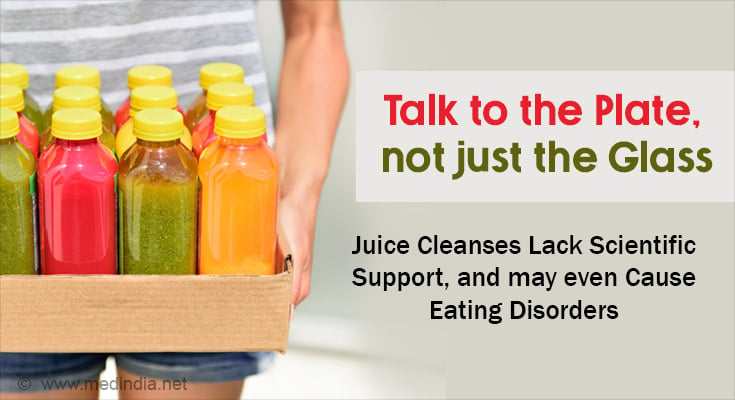Examining the link between juice cleanses and weight loss, a 2017 study suggests alterations in gut bacteria during a 3-day juice-only diet.
Caution: The calorie intake during the study was notably below recommended levels, potentially leading to rapid weight loss.
Contrary to popular belief, scientific evidence supporting the idea that juice cleanses flushing toxins from the body is lacking.
Advertisement
While certain detox treatments may aid liver function, flawed studies, and inconclusive evidence raise questions about the efficacy of juice cleanses in this regard.
Risks Associated with Juice Cleanses
Despite potential benefits, engaging in juice cleanses may pose risks.
Inadequate solid food intake can lead to increased hunger, energy restrictions, tiredness, headaches, and irritability.
Additionally, the lower dietary fiber content in juices compared to whole fruits may impact blood sugar management and overall health.
Juice cleanses’ influence on individuals’ relationships with food is a growing concern.
Obsessive preoccupation with health-promoting foods and avoidance of “less healthy” options can contribute to conditions such as orthorexia nervosa and bulimia nervosa, highlighting the need for mental health awareness (2✔ ✔Trusted Source
“Detoxes” and “Cleanses”: What You Need To Know
Go to source).
Recognizing that organs like the liver, kidneys, and lungs are adept at eliminating harmful compounds, alternative approaches to nourishment are explored.
READ RELATED: 10 Restaurant Chains That Serve the Best Bolognese Pasta
Suggestions include adopting a well-balanced, anti-inflammatory diet, engaging in regular physical activity, limiting sugar intake, opting for smoothies over juices, staying hydrated, and embracing mindful eating practices.
Embracing a well-rounded, wholesome diet comprising whole foods serves as the foundation for achieving optimal health and averting illnesses. While juices can be a beneficial addition to your dietary choices, it is crucial not to substitute them for solid food (4✔ ✔Trusted Source
Detox diets for toxin elimination and weight management: a critical review of the evidence
Go to source).
Scientific substantiation for the efficacy of juice cleanses is notably lacking, and their suitability varies among individuals, potentially fostering an unhealthy connection with food and even contributing to eating disorders.
For those apprehensive about their dietary habits, seeking guidance from a healthcare professional or a registered dietitian is recommended. Their expertise can assist in devising a personalized plan tailored to individual needs and concerns.
In conclusion, while juice cleanses may offer some benefits, understanding the potential risks and exploring holistic approaches to nourishment is essential for maintaining overall health and well-being.
References :
- Potential relationship between juice cleanse diets and eating disorders. A qualitative pilot study – (https://pubmed.ncbi.nlm.nih.gov/29983105/)
- “Detoxes” and “Cleanses”: What You Need To Know – (https://www.nccih.nih.gov/health/detoxes-and-cleanses-what-you-need-to-know)
- Health benefit of vegetable/fruit juice-based diet: Role of microbiome – (https://www.ncbi.nlm.nih.gov/pmc/articles/PMC5438379/)
- Detox diets for toxin elimination and weight management: a critical review of the evidence – (https://pubmed.ncbi.nlm.nih.gov/25522674/)
Source: Medindia







